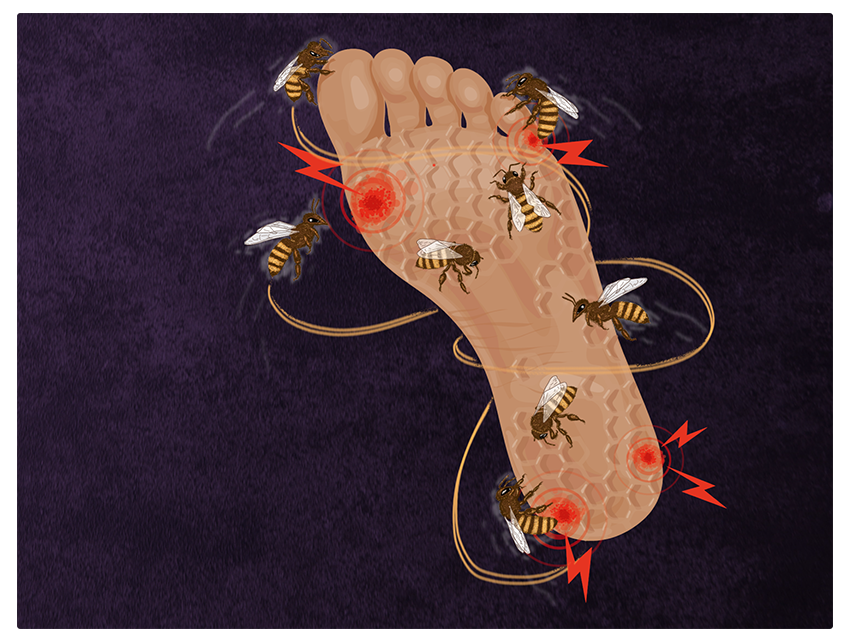
Do you struggle with pain due to diabetes?
If you struggle with chronic nerve pain in your legs due to diabetes (diabetic peripheral neuropathy, or DPN), Vertex Pharmaceuticals is conducting research studies that may be an option.
If you struggle with chronic nerve pain in your legs due to diabetes (diabetic peripheral neuropathy, or DPN), Vertex Pharmaceuticals is conducting research studies that may be an option.

Vertex is conducting multiple clinical research studies on pain related to DPN.
To join one of these studies, an individual must:
- Be between the ages of 18 and 80
- Have a diagnosis of type 1 or type 2 diabetes
- Have pain in both legs due to DPN for at least one year
There are additional requirements for participation, which the study team will discuss with interested individuals.
A clinical trial is a carefully designed research study involving human volunteers to investigate the safety and effectiveness of a new drug or treatment. Clinical trials are essential for evaluating the benefits and risks of medical interventions, ultimately informing healthcare decisions and regulatory approvals.
As a clinical trial or observational study participant, your responsibilities and what you will be required to do can vary depending on the study, its objectives, and the phase of the trial.
Some common activities and responsibilities you may encounter as a participant include: diagnostic tests, treatments, procedures, doctor visits, dietary changes, exercise and/or other lifestyle changes. Observational studies often involve minimal effort, such as completing questionnaires, sharing test results, maintaining a diet or exercise log.
Joining a clinical trial can provide access to cutting-edge treatments, close medical monitoring, and an opportunity to contribute to medical knowledge. Participants may experience improved health outcomes and specialized care while potentially receiving compensation for volunteering.
Clinical trials are designed with a strong emphasis on the safety of participants, and multiple safeguards are in place to minimize risks, including careful study design, oversight by institutional review boards and routine monitoring of study data by independent experts. Researchers must inform participants of the risks, benefits and/or side effects they discover.
Yes, you can drop out of a clinical trial study at any time, and you have the right to do so without facing any penalties or consequences. This is often referred to as "withdrawal of consent."
Voluntary participation is a fundamental principle of clinical research. You are not obligated to continue in a trial if you no longer wish to do so.
Determining your eligibility to participate in a clinical trial involves a thorough evaluation of specific eligibility criteria set forth by the study's researchers and sponsors. The criteria help define the patient population being studied and are designed to protect the safety of participants in the trial.
Providing accurate information about your medical history and health status is crucial for your safety and the integrity of the research. If you are not eligible for one trial, you may still be eligible for other trials in the future, so it's worth exploring your options if you are interested in participating in clinical research.
Yes, we do! Have a friend or family member who may also want to participate in one of our studies?
For qualifying studies, we offer a $25 gift card for each friend or family member that you refer. Restrictions apply. Please ask about our referral program during your screening visit.
About the DPN Pain Program
The purpose of these studies is to understand if an investigational drug is safe and effective for adults with pain associated with diabetic peripheral neuropathy (DPN). The word “investigational” means these medications are not yet approved for use by the US Food and Drug Administration (FDA) or other regulatory agencies in Canada, Europe, or elsewhere.
These non-opioid investigational drugs are being developed for the management of pain. They are designed to target a sodium channel in the body called Nav1.8, which plays an important role in pain signaling. Researchers are evaluating if blocking this channel will treat pain from DPN.


About the DPN Pain Program
The purpose of these studies is to understand if an investigational drug is safe and effective for adults with pain associated with diabetic peripheral neuropathy (DPN). The word “investigational” means these medications are not yet approved for use by the US Food and Drug Administration (FDA) or other regulatory agencies in Canada, Europe, or elsewhere.
These non-opioid investigational drugs are being developed for the management of pain. They are designed to target a sodium channel in the body called Nav1.8, which plays an important role in pain signaling. Researchers are evaluating if blocking this channel will treat pain from DPN.
